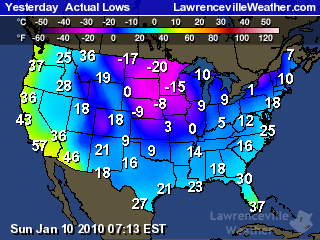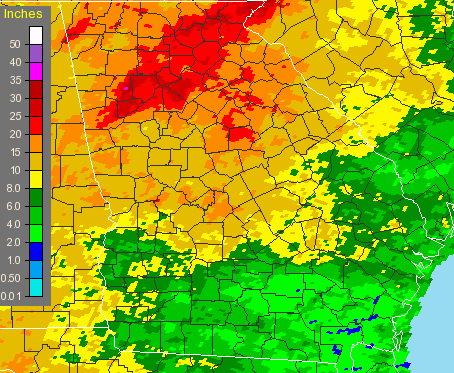Record Cold Hangs On
Sunday, January 10th, 2010It seems like the cold weather just doesn’t want to go away. With the turn of the new year, the weather pattern changed as well, with high pressure systems over the Plains states and off of New England forming an opening between to allow unusually cold air to sweep southward. Mix that with a non-existent southern jet stream, and the cold moves across the eastern seaboard.
 The map to the right shows the low temperatures across the country on January 9th. For the first ten days of the month, the mean temperature I’ve recorded here is 27.5 degrees–below the normal low for this time of year, which should be 33. The mean temperature for the same period in 2009 was 49.9.
The map to the right shows the low temperatures across the country on January 9th. For the first ten days of the month, the mean temperature I’ve recorded here is 27.5 degrees–below the normal low for this time of year, which should be 33. The mean temperature for the same period in 2009 was 49.9.
We haven’t seen record cold, though. The lowest temperature I recorded here through the period was 13.5, last seen on January 16, 2009. The 13.9 chiller ties the record for the coldest temperature my thermometer has measured over the last eight years. Official records from Atlanta Hartsfield put the low records for the first ten days of the month in the single digits.
The good news (if there is any) is that with the extremely cold temperatures, we didn’t get a lot of precipitation. The snow on Thursday amounted to less than half an inch in my yard. Panic, school closings and shortages of bread and milk all occurred, but that’s par for Atlanta. I don’t know how much liquid precipitation fell on Thursday–snow and my rain gauge don’t play well together–but it was the longest stretch without rain since the latter part of November.
Elsewhere, heavy snow and cold led to snowplows being thwarted in the Midwest, and even snow flurries reported in Miami yesterday by the National Weather Service:
BY THE WAY…COUPLE TRAINED WEATHER SPOTTERS REPORTED A FEW SNOW FLURRIES IN THE WEST BOYTON BEACH… AND A FEW SMALL ICE PELLETS IN PALM BEACH THIS EVENING WITH THE RAIN SHOWERS. ANOTHER TRAINED STORM SPOTTER IN BROWARD COUNTY REPORTED A FEW FLURRIES IN OAKLAND PARK WITH THE LIGHT RAIN SHOWERS EARLY THIS EVENING…ALONG WITH A TRAINED SPOTTER IN MIAMI-DADE COUNTY REPORTING A FEW FLURRIES WITH SOME SLEET JUST SOUTHEAST OF TOWN AND COUNTY MALL.
It has been interesting to watch the forecasts over the past few days. Earlier last week, forecasts were predicting 50 degree temperatures today. It got up to 34. By Thursday, it’s supposed to be in the upper 50s. Want to bet it gets there? The models used to forecast upcoming weather assume that cold spells in the southeast are somewhat short-lived, so they try to get back to normal temperatures fairly quickly. This bias is what causes predictions of an earlier than actual warmup.
It will warm up. The North American Oscillation, which is a good indicator of temperatures on the east coast is trending positive, and the 6-10 and 8-14 day forecasts call for warmer than normal temperatures in the southeast. But, I wouldn’t be surprised to see another one or two rounds of colder than normal temperatures before winter ends in March.
And of course, when it finally does warm up by next weekend, what are we going to get? Significant rainfall and a chance of flooding. But that’s a topic for another post. And for those that asked I will try to post more. Blame the holidays and a busy schedule.
Sphere: Related Content

